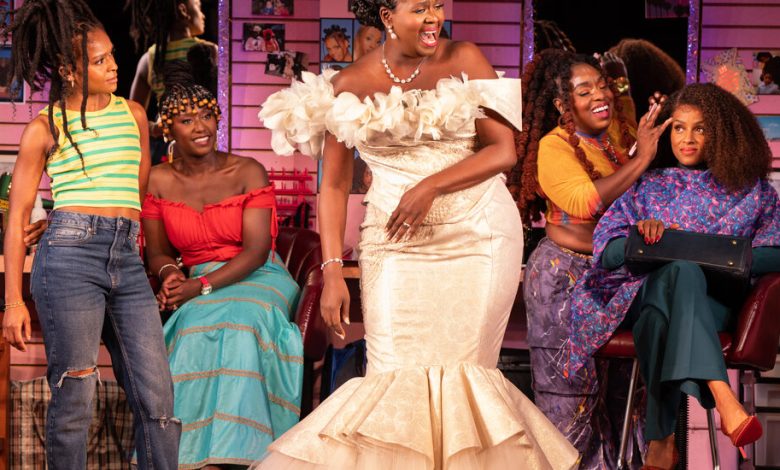Review: At ‘Jaja’s,’ Where Everybody Knows Your Mane

Nothing says comedy to me like hot pink, and pink doesn’t get much hotter than the pink of the house curtain that greets you at the beginning of “Jaja’s African Hair Braiding” by Jocelyn Bioh. In the pale and staid Samuel J. Friedman Theater, a fuchsia drop depicting dozens of elaborately woven hairstyles — micro braids, cornrows, “kinky twists” and more — tells you, along with the bouncy Afro-pop music, to prepare for laughter.
That will come in abundance, but don’t in the meantime ignore Jaja’s storefront: gray and grimy and contradicting the pink. With its roll-up grille fully locked down, it’s telling you something too.
What that is, Bioh does not reveal until quite late — almost too late for the good of this otherwise riotously funny workplace comedy set in prepandemic, mid-Trump Harlem. A kind of “Cheers” or “Steel Magnolias” for today, “Jaja’s” is so successful at selling the upbeat pluck and sharp-tongued sisterhood of its West African immigrants that the hasty dramatization of their collateral sacrifice feels a bit like a spinach dessert.
No matter: The first 80 minutes of the 90-minute play, which opened on Tuesday in a Manhattan Theater Club production, are a buffet of delights. Even David Zinn’s set for the beauty shop’s interior, once the grate is unlocked and lifted, receives entrance applause. From that moment on, the director, Whitney White, keeps the stage activated and the stories simmering at a happy bubble.
Unlike the Ghanaian private school students in Bioh’s “School Girls; or, the African Mean Girls Play” and the star-struck Nigerians in her “Nollywood Dreams,” the stylists at Jaja’s are independent contractors. I don’t just mean financially, though they negotiate their prices privately and pay Jaja a cut. They also operate independently as dramatic figures, their plots popping up for a while, momentarily intersecting with the others’, then piping down to make room for the next.
That’s fine when the plots and intersections are so enjoyable. Five women work at the salon in the hot summer of 2019, not counting Jaja’s 18-year-old daughter, Marie (Dominique Thorne), who runs the shop’s day-to-day operations. It’s she who lifts the grate and seems to shoulder the heaviest burdens. Her hopes for college, and a career as a writer, hang by a thread of false papers.
Romance and dominance are the main concerns of the others. As her name suggests, Bea (Zenzi Williams) is the queen, at least when Jaja is not around, and stirs up drama from an overdeveloped sense of personal entitlement. “When I get my shop, there won’t be any eating of smelly foods like this,” she snarks at her friend Aminata, innocently enjoying fish stew.
Today Bea is especially infuriated because she believes that Ndidi (Maechi Aharanwa), a younger, faster braider, is stealing her clients. Meanwhile — and the adverb is apt because the subplots often echo the West African soap operas the women watch on the salon’s television — Aminata (Nana Mensah) is fuming over her scoundrelly husband, who wheedles her out of her hard-earned money and spends it on other women. Sweeter and quieter and more self-contained, Miriam (Brittany Adebumola) gradually reveals another side as she tells a client what she gladly escaped, and yet regrets leaving, in Sierra Leone.
The problem of men is a common theme: Even Jaja (Somi Kakoma), who eventually makes a spectacular appearance, is caught up in what may or may not be a green-card marriage scam with a local white landlord. But except for Aminata’s husband, the men we actually meet — all played by Michael Oloyede in nicely distinguished cameos — are kind and cheerful, hawking socks, jewelry, DVDs and affection.
Kind and cheerful is not the case with all the clients. (There are seven, played by three actors.) One is so rude just entering the shop that the braiders, usually hungry for business, pretend to be booked. Another client demands to look exactly like Beyoncé for her birthday; another is a loud talker. One mostly eats while Bea refreshes her elaborate do, a Strawberry Knotless Afro-Pop Bob. And Jennifer (Rachel Christopher) sits patiently in Miriam’s chair throughout, receiving long micro braids that take 12 hours and fingers of steel.
Never really forging these bits into a single narrative, Bioh makes comic music of them, sometimes with the set-it-up-now, pay-it-off-later approach and sometimes with a scrapper’s punch-feint-return. Without White’s orchestration of the rhythm — and the perfect timing of the cast, most of them making Broadway debuts — I can’t imagine this working. Nor would it be as enjoyable without Dede Ayite’s sociologically meticulous costumes or the brilliance of the title characters. And by “title characters” I of course mean the hairstyles, rendered in before, during and after incarnations by Nikiya Mathis’s wigs, which seem to be holding a conversation of their own.
If the entire play had been nothing but byplay — the women in one another’s hair both figuratively and literally — I would not complain. Translating a popular genre to a new milieu and stocking it with characters unfamiliar to most American theatergoers, as Bioh did in “School Girls” as well, is refreshing enough when crafted so smartly.
But instead she has seen fit, again as in “School Girls,” to deepen and darken the story while providing a bang of activity at the end. Though abrupt and insufficiently resolved, it doesn’t come from nowhere. By the last of the play’s six scenes, all the women, but especially Jaja and her daughter, have something to fear from a president who has recently referred to some African countries with a disparaging vulgarism and complained that Nigerians allowed to enter the United States would never go back.
“OK, so you want me to go? Fine, I will go,” Jaja exclaims witheringly, in what seems like a direct response. “But when do you want me to leave? Before or after I raise your children? Or clean your house? Or cook your food? Or braid your hair so you look nice-nice before you go on your beach vacation? ‘Oh please miss. Can you give me the Bo Derek hair please?’”
“Jaja’s” is full of such treasurable moments, when the drama feels tightly woven with the comedy. And if the weave frays a bit at the end, what doesn’t? Like the Strawberry Knotless Afro-Pop Bob, it’s still a great look.
Jaja’s African Hair Braiding
Through Nov. 5 at the Samuel J. Friedman Theater, Manhattan; manhattantheatreclub.com. Running time: 1 hour 30 minutes.





